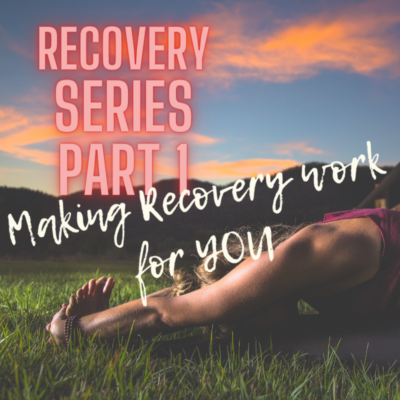How to make recovery days work for you:
We all know recovery is an incredibly important protocol in all training and programming modalities. A major theme amongst athletes is: how can I make my recovery days work for me?
Your body knows exactly when it needs to recover and/or rest. The best part is that our bodies constantly try to tell us this! BUT, we don’t necessarily always hear, listen, or understand what our body is actually telling us.
If you’re reading this and thinking, “I have no idea when to rest or recover!” It’s okay! This is something that takes years of experience to hone in on as a skill. Listening to and learning your body’s language so you can become fluent enough with yourself to know when to say when… takes practice.
You may have heard the following phrases at some point:
• passive recovery
• active recovery
• push through and benefit
• no benefit if you don’t push through
• movement will make you feel better
• it’s too soon to try that again
Sound familiar? As a Certified Strength and Conditioning Specialist, I’ve encountered more and more of these phrases the longer I work with athletes. With that said, it is rare to become fluent in any one dialect of another athlete’s physiological language because we aren’t that good at deciphering code. =) However, with enough experience and practice, seasoned professionals get pretty good at solving them.
IT’S ALL INDIVIDUAL:
Your journey to your personal goals involves many repeated cycles of breakdown and recovery. The degree to which you break down and recover are related to each other, and these can be both manipulated by programming and fine-tuned by communicating effectively with your body.
NEVER FEEL GUILTY. You don’t have to like what you’re “hearing” from your body, but what your body may benefit the most from is the byproduct of causation, not a personal attack on you or your goals.
You might consult someone with more experience for ideas on what they consider to be a good recovery day or rest, as well as how they utilize it within their training programs. But, keep in mind, that their ideas may or may not translate to what works best for YOU. This is where consulting a strength and conditioning specialist can be incredibly beneficial to you. They often have the experience of working with hundreds of athletes to decipher what the body is saying. They’re able to take notes of patterns and similarities across a broad spectrum of athletes.
Proper recovery can never be “wrong.”
It can sometimes be inconvenient, but if you’re translating correctly it’s the only right answer for your goals. If your body tells you it needs full recovery prior to your prescribed rest day(s), don’t think “I couldn’t handle it.” Instead think, “I worked harder than the programming anticipated.”
Be proud that you pushed yourself that hard.
Continue to refine your ability to match the prescribed intensities and work:rest schemes, because when properly followed they are the best established way to achieve your goals. In the end you ultimately decide what is the best avenue for yourself.
THE BOTTOM LINE:
As the athlete, you are the sole responsible party for your recovery. It is a fluid development throughout your training season. You may need more rest and recovery during intense parts of your training, and you may need to push through fatigue during others. You’re not always going to get it right, but you have a better chance at it, than any trainer.
It’s not always a matter of “being honest” with yourself (ex: “do I honestly need the day off or am I just a little more sore than I expected”). Sometimes it’s just not an easy translation (ex: “I’m not sure if I’m too sore to complete the workout, or if I will loosen up as I get going”).
These aren’t easy distinctions, but you’ll be able to translate them easier the longer you stick with your training. You will establish a system of your own “if…then” scenarios specific to your training experience. Once you establish a bank of these scenarios, you eradicate the feeling of guilt and come to terms with doing what is best for your training.
UNPLANNED RECOVERY:
Need a recovery day today and not two days from now when it’s “scheduled?” Take it. Figure out the “If I take my recovery day today, then…” scenario. Maybe it’s a matter of just inserting your recovery and rest day into today’s plans, and pushing everything back a day and eliminating the scheduled rest day two days from now. Maybe your body is telling you to take both. That’s okay — listen to your body.
Will you sneak the occasional rest day in that may not have been a physical necessity but rather an emotional one? Damn right you will. Don’t feel guilty about those either.
About the Author:
Palmer Shape holds a B.S. in Physiology and is a Certified Strength and Conditioning Specialist designation (CSCS). Palmer Shape is equipped with over a decade of competition experience, having coached and trained hundreds of high school, college, and professional athletes, including obstacle course racers. A hurdler by nature, he is no stranger to overcoming obstacles quickly and efficiently. His passion, combined with scientific knowledge and data, have helped hundreds of athletes take their training to the next level, often reaching podium spots or winning coveted titles.
Follow him on Instagram at @Palmer_Shape


